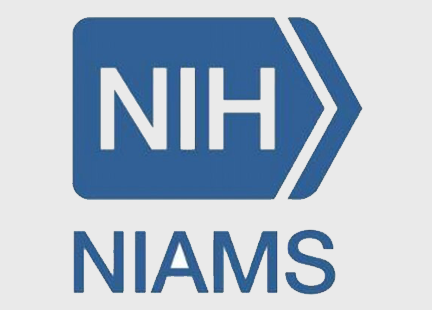
As part of ongoing efforts to move promising laboratory discoveries into clinical practice, the National Institute of Arthritis and Musculoskeletal and Skin Diseases (NIAMS) has funded two new Centers of Research Translation (CORTs), and continued its support for two existing Centers. Each CORT addresses one disease within the NIAMS mission with a multidisciplinary approach. A minimum of three highly meritorious translational research projects, as well as an administrative core, form the basic elements of the CORT.
"The Centers are part of an NIH-wide effort to translate scientific discoveries into improvements in clinical care," said NIAMS Director Stephen I. Katz, M.D., Ph.D. The new CORTs focus on gout, leprosy, orthopaedic trauma, and osteoarthritis.
This year’s CORT awards include:
Center for Research Translation on Gout, headed by Kenneth G. Saag, M.D., at the University of Alabama at Birmingham. This CORT will focus on the clinical and societal factors that contribute to an increased prevalence of gout and hyperuricemia (high levels of uric acid in the blood"a risk factor for gout) among African Americans, in comparison with Caucasians. A multidisciplinary team of researchers will identify the molecular indicators of gout and inflammation in the patient populations, and analyze patterns of clinical care for gout that may produce different outcomes in African Americans and Caucasians. The Center will also test novel approaches for delivering gout treatment.
Immunobiology of Leprosy, led by Robert L. Modlin, M.D., at the University of California, Los Angeles. This CORT will investigate immune signaling pathways in the skin that influence resistance or susceptibility to Mycobacterium leprae (M. leprae), the bacterium causing leprosy. The different components of the Center will address the molecular characteristics of M. leprae, and genetic control of the patient’s immune response to them. The Center will also continue investigations of vitamin D’s role in the body’s reaction to M. leprae, leading to a successful fight against the infection or the development of leprosy. The findings from these studies will shed light on a persistent global health problem, and provide a model for further investigations of the skin’s immune responses.
Translating Molecular Signal Pathways to Orthopaedic Trauma Care, headed by Regis O’Keefe, M.D., Ph.D., at the University of Rochester. The Center will build on the success of a multidisciplinary team that has analyzed the role of adult stem cells (SCs) in the body’s response to and repair of musculoskeletal injuries. The new studies will employ cell culture techniques, animal models, and human clinical investigations into the molecular, cellular, and physiological effects of parathyroid hormone (PTH) in preventing long-term damage from bone and joint injuries. PTH affects many mechanisms in bone remodeling and healing, and it is used as a drug to increase bone formation in patients with osteoporosis. The Center will study the processes that are stimulated by PTH treatment, to prevent the development of osteoarthritis following knee injuries, for enhancing fracture healing in older patients who have fragile bones, and for improving the success of bone grafts.
Innovations to Assess and Forestall Post-Traumatic Osteoarthritis, led by Joseph Buckwalter, M.D., at the University of Iowa. Another CORT renewal will continue studies to understand the development of osteoarthritis following joint injury (post-traumatic osteoarthritis, or PTOA). The Center will also investigate interventions to minimize the onset of PTOA and enhance joint healing. The Center’s use of basic cell biology, bioengineering, imaging, and clinical research will lead to advances in assessing joint injuries, developing therapeutic approaches that target molecular and cellular mechanisms in PTOA, and improving surgical treatments of joint injuries to forestall PTOA.
For more information on the NIAMS Centers of Research Translation Program, visit this page.
# # #
The mission of the National Institute of Arthritis and Musculoskeletal and Skin Diseases (NIAMS), a part of the U.S. Department of Health and Human Services’ National Institutes of Health (NIH), is to support research into the causes, treatment, and prevention of arthritis and musculoskeletal and skin diseases; the training of basic and clinical scientists to carry out this research; and the dissemination of information on research progress in these diseases. For more information about the NIAMS, call the information clearinghouse at (301) 495-4484 or (877) 22-NIAMS (free call) or visit the NIAMS website at www.niams.nih.gov.
